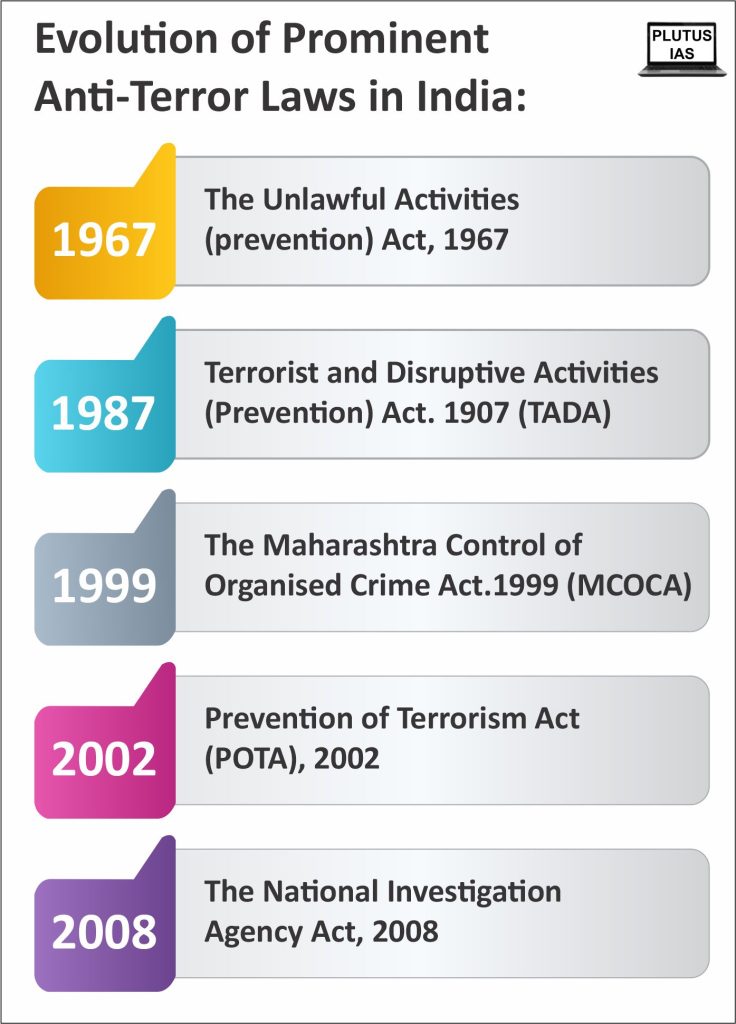14 Feb UAPA
This article covers ‘Daily Current Affairs’ and the topic details of “UAPA”.This topic is relevant in the “Security” section of the UPSC CSE exam.
Why in the News?
The Supreme Court recently refused bail to Gurwinder Singh, an accused in an alleged Khalistan module. He has been accused of being involved in a bigger conspiracy with Sikhs for Justice, a pro-Khalistan organisation banned by the Indian government. Courts have occasionally granted bail under the UAPA, despite its tougher bail terms. They have construed Section 43D (5) to permit bail in some extraordinary circumstances.
About Unlawful Activities (Prevention) Act (UAPA)
This Act aims to deal with terrorist activities, activities that threaten India’s integrity and sovereignty, and the more effective prevention of certain illegal activities by people and groups.
ABOUT UAPA
- The law covers the entirety of India and is applicable to both Indian citizens and foreign nationals. In addition, this Act’s provisions also apply to: (a) Indian citizens living abroad; (b) those working for the government, wherever they may be; and (c) individuals on ships and planes registered in India, wherever they may be.
Key Provisions of UAPA:
- Declaration of Unlawfulness: The Act confers absolute authority upon the central government. If the government deems any association to be or to have become an unlawful association, it can declare such an association as unlawful through an official notification in the Gazette.
- Chargesheet Filing: The investigating agency is permitted to file a chargesheet within a maximum period of 180 days following arrests, with the possibility of further extensions after informing the court.
- Punishments: The Act prescribes the death penalty and life imprisonment as the most severe punishments.
- Section 3 of the UAPA Act grants the government the authority to designate an association “unlawful”. Declaring an entity as unlawful includes criminalising its membership and forfeiting the organization’s assets.
- Section 4: To have the prohibition approved, the government must send a notification to the Unlawful Activities Prevention Tribunal within 30 days of publishing the gazette notification.
- Section 7: The government has the authority to ban the use of funds from an unlawful group.
- Section 8: All locations used by the illegal association can be reported and seized.
Amendments to the Act till now
- 2004 Amendment: In 2004, the inclusion of the “terrorist act” in the list of offenses allowed the banning of organizations engaged in terrorist activities. Prior to this amendment, “unlawful” activities were associated with actions related to secession and cession of territory.
- 2019 Amendment: The 2019 amendment grants the Central Government the authority to identify individuals as terrorists based on specific grounds. It also authorizes the Director-General of the National Investigation Agency (NIA) to approve the seizure or attachment of property during NIA investigations. Additionally, officers of the NIA, with a rank of Inspector or above, are now empowered to investigate terrorism cases, a responsibility previously limited to officers with the rank of Deputy Superintendent or Assistant Commissioner of Police.

Supreme Court’s Stance on Section 43D(5) of UAPA:
- The Supreme Court, through various rulings, has shaped the interpretation of Section 43D(5). In the 2019 case of Zahoor Ahmed Shah Watali, the court emphasized accepting the state’s case without delving into its merits while considering bail applications.
- Subsequent cases, such as Union of India v K A Najeeb in January 2021, acknowledged bail as an exception under UAPA. The Court acknowledged that it could override the legislative intent against bail if there was a significant delay in completing the trial, and if the period of incarceration exceeded a substantial portion of the prescribed sentence.
- However, in July 2023, the Supreme Court, in the case of Vernon Gonsalves v State of Maharashtra, diverged from the Watali ruling on the application of the “prima facie true” test. The court must conduct some basic analysis of the evidence’s value during the bail examination and be convinced of the quality of evidence for the test to be satisfied.
- The existence of conflicting opinions from benches with an equal number of judges raises the prospect of future benches resolving the discrepancy. Should significant disagreement persist, a larger bench may be required to settle the legal interpretation.
Download plutus ias current affairs eng med 14th Feb 2024
Prelims practice questions:
Q1. Consider the following statements:
- Section 43D(5) of UAPA sets strict criteria making bail difficult
- State Government has the power to declare an association as unlawful under UAPA
Which of the statements given above is/are correct?
A. 1 only
B. 2 only
C. Both 1 and 2
D. Neither 1 nor 2
ANSWER: A
Mains practice question
Q1) Discuss the implications of Section 43D(5) of the UAPA on an individual’s right to freedom of speech and expression. How does the stringent bail provision potentially affect the exercise of this fundamental right in the context of counter-terrorism measures?
I am a content developer and have done my Post Graduation in Political Science. I have given 2 UPSC mains, 1 IB ACIO interview and have cleared UGC NET JRF too.



No Comments